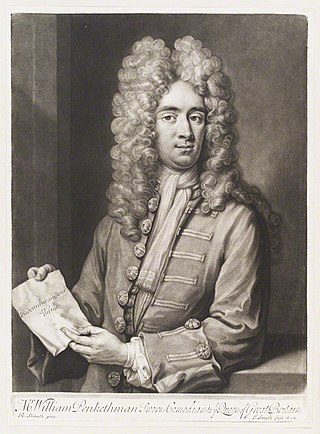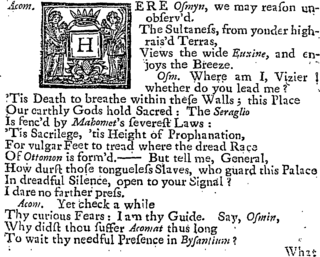
William Pinkethman was an English comic actor, a low comedian with a droll style, and theatre manager. He was considered an imitator of Anthony Leigh.
Sir Harry Wildair is a 1701 comic play by the Irish writer George Farquhar. It is a sequel to the 1699 hit The Constant Couple, portraying the further adventures of the most popular character from the earlier play.

An Act at Oxford is a 1704 comedy play by the English writer Thomas Baker. Although scheduled to appear at the Theatre Royal, Drury Lane that year it had censorship problems from the Lord Chamberlain, likely through the influence of the Oxford University authorities. Although performed earlier it did not have its London debut at Drury Lane until October 1705 under the alternative title of Hampstead Heath.
The Wife of Bath is a 1713 comedy play by the British writer John Gay. It was inspired by The Wife of Bath's Tale by Geoffrey Chaucer. The play marked a conscious switch by Gay towards an apolitical and distant past, after his contemporary work The Mohocks had faced controversy and censorship the previous year. Robert Wilks, a celebrated actor and manager of the Drury Lane Theatre, appeared as Chaucer. The title role of the wife was played by Margaret Bicknell with Mary Porter as Myrtilla and the cast rounded out by William Bullock, Lacy Ryan, Christopher Bullock, William Pinkethman, Susanna Mountfort and Henry Norris.

The Sultaness is a 1717 tragedy by the British writer Charles Johnson. It is a reworking of the 1672 French play Bajazet by Jean Racine set in the Ottoman Empire. In common with early eighteenth century plays it places much greater emphasis on the emotional anguish of its female characters than Racine's original.

The Siege of Damascus is a 1720 tragedy by the British writer John Hughes. It was inspired by Simon Ockley's 1708 study Conquest of Syria, and focuses specifically on the Siege of Damascus in 634.
The Modish Husband is a 1702 comedy play by the English writer William Burnaby. It is in the Restoration-style comedy of manners.
The Play is the Plot is a 1718 comedy play by the British writer John Durant Breval.

The Provoked Husband is a 1728 comedy play by the British writer and actor Colley Cibber, based on a fragment of play written by John Vanbrugh. It is also known by the longer title The Provok'd Husband: or, a Journey to London.
The False Friend is a 1702 comedy play by the English writer John Vanbrugh. It was inspired by Francisco de Rojas Zorrilla's Spanish play La traición busca el castigo.

She Would and She Would Not is a 1702 comedy play by the English actor-writer Colley Cibber.
The Bath; or, The Western Lass is a 1701 comedy play by the English writer Thomas d'Urfey.
The Old Mode and the New is a 1703 comedy play by the English writer Thomas d'Urfey.
The Fine Lady's Airs is a 1708 comedy play by the British writer Thomas Baker.

The Volunteers is a 1692 comedy play by the English writer Thomas Shadwell. Shadwell completed the play shortly before his death and it was performed posthumously at the Drury Lane Theatre by the United Company. It is also known by the long title The Volunteers; or, The Stock-Jobbers.

The Country Lasses: or, The Custom of the Manor is a 1715 comedy play by the British writer Charles Johnson.

The Cobbler of Preston is a 1716 comedy play by Christopher Bullock, although a separate play of the same title was written by Charles Johnson the same year. A one-act afterpiece is the origin of the phrase "Tis impossible to be sure of anything but Death and Taxes". In the preface to the published version Bullock suggested that he had begun writing the play just four days before its premiere. It takes inspiration from The Taming of the Shrew by William Shakespeare and is set in Preston, Lancashire. The town had recently been scene of fighting during the 1715 Jacobite Rebellion at the Battle of Preston. Bullock's play does not overtly reference the rebellion, but has undertones supportive of the Hanoverian Dynasty.

The Rival Fools is a 1709 comedy play by the British writer Colley Cibber. It drew inspiration from the earlier play Wit at Several Weapons. Despite Cibber's previous record of turning out hits, it was not a great success.
The Lying Lover; Or, The Lady's Friendship is a 1703 comedy play by the Irish writer Richard Steele. It was his second play, written while he was an army office doing garrison duty in Harwich during the War of the Spanish Succession. It is described as being both a restoration comedy and a sentimental comedy, and marked the transition between the two.
Woman's Wit is a 1697 comedy play by the English writer Colley Cibber. It premiered at the Theatre Royal, Drury Lane. Cibber had originally written the play for the performers of Thomas Betterton's company at Lincoln's Inn Fields and he partly attributed the work's failure to the differing qualities styles of the rival Drury Lane company. The original Drury Lane cast included Cibber as Longville, William Pinkethman as Major Rakish, George Powell as Jack Rakish, Thomas Doggett as Johnny, Mary Powell as Lady Manlove, Jane Rogers as Emilia, Catherine Cibber as Olivia and Mary Kent as Lettice.










